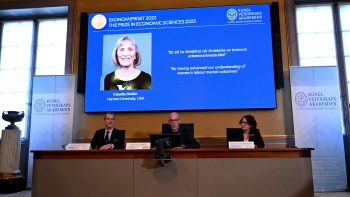Nobel Prize winners’ research could inform U.S. economic policy
Nobel Prize winners’ research could inform U.S. economic policy
Steve Chiotakis: Two economists have been awarded the Nobel prize in economics; Christopher Sims and Thomas Sargent will split the $1.5 million prize. Both studied the correlation between the economy and the way government policy affects it.
Art Rolnick is professor of economics at the University of Minnesota, where Sargent and Sims both taught for a time, and he’s friends with both of them. Rolnick is with us now. Good morning professor.
Art Rolnick: Good morning.
Chiotakis: So this research involves how policy decisions affect the economy. Why does that matter right now?
Rolnick: Well, it always matters. Cause and effect is tough issue in economics because we can’t do real experiments with the economy, so we have to glean from historical data what policies will impact unemployment, inflation, the business cycle, etc. And these two are leaders — for many, many years –leaders in developing the theory and empirical work to help us distinguish between actions that actually affect the economy in positive wasy, and those that don’t.
Chiotakis: You used to work with each one of these gentlemen — Professor Sargent and Sims — how do you think they reacted to the news? What was going through their minds, do you think?
Rolnick: My guess is they were a bit surprised. Right now, I would say macroeconomics is not in very high regard, especially given the problems we’re having in this current economy with unemployment remaining so high. Nevertheless, it’s times like this when we really need the kind of research they’ve done to help us work our way through what it’s going to take to develop good policy so that we can minimize these kind of problems.
Chiotakis: Do you think that Washington is paying attention to what these guys are saying now?
Rolnick: That’s a good question. They should be. I don’t know. I know Larry Summers, who was a president’s chief economic adviser for many years is very familiar with both the work of Tom Sargent and Chris Sims. So I hope they are — I hope they’re taking a hard look at what these guys say because I think it would lead to a much better outcome in the future.
Chiotakis: Professor Art Rolnick from the University of Minnesota. Professor, thanks.
Rolnick: Thank you, sir.
There’s a lot happening in the world. Through it all, Marketplace is here for you.
You rely on Marketplace to break down the world’s events and tell you how it affects you in a fact-based, approachable way. We rely on your financial support to keep making that possible.
Your donation today powers the independent journalism that you rely on. For just $5/month, you can help sustain Marketplace so we can keep reporting on the things that matter to you.


















